How fast can the world decarbonize?
The truth is, we have no idea. But it better be fast.


A free daily email with the biggest news stories of the day – and the best features from TheWeek.com
You are now subscribed
Your newsletter sign-up was successful
This weekend, international leaders managed to hammer out a deal for how to tackle climate change. And on the surface, it's not hard to see why naysayers on both the left and right are declaring it a giant nothingburger.
The agreement is largely voluntary: 187 countries submit pledges to reduce greenhouse gas emissions based on what they think they can handle. Most of the structure the deal provides is a regular process to check in on progress and revise goals. If all the current pledges stick, global warming this century will likely be between 2.7 and 3.5 degrees Celsius — well above the 2 degrees Celsius threshold considered safe, and the agreement's ideal goal of 1.5 degrees.
But maybe the most daunting thing is the sheer scale of the change the global economy must undergo to get warming under control.
The Week
Escape your echo chamber. Get the facts behind the news, plus analysis from multiple perspectives.

Sign up for The Week's Free Newsletters
From our morning news briefing to a weekly Good News Newsletter, get the best of The Week delivered directly to your inbox.
From our morning news briefing to a weekly Good News Newsletter, get the best of The Week delivered directly to your inbox.
Here, for instance, is Roger Pielke, Jr.'s analysis of how much global power consumption comes from green sources now, and where it needs to go by the last quarter of the 21st century:
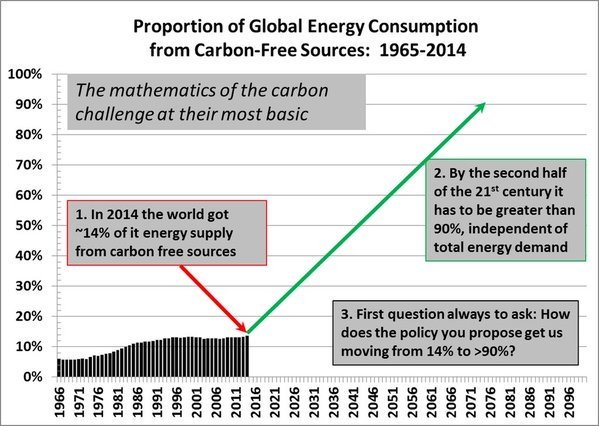
(Analysis courtesy of Roger Pielke, Jr., based on data from BP Statistical Review.)
And here's the path annual global emissions have to follow, based on which year they peak.
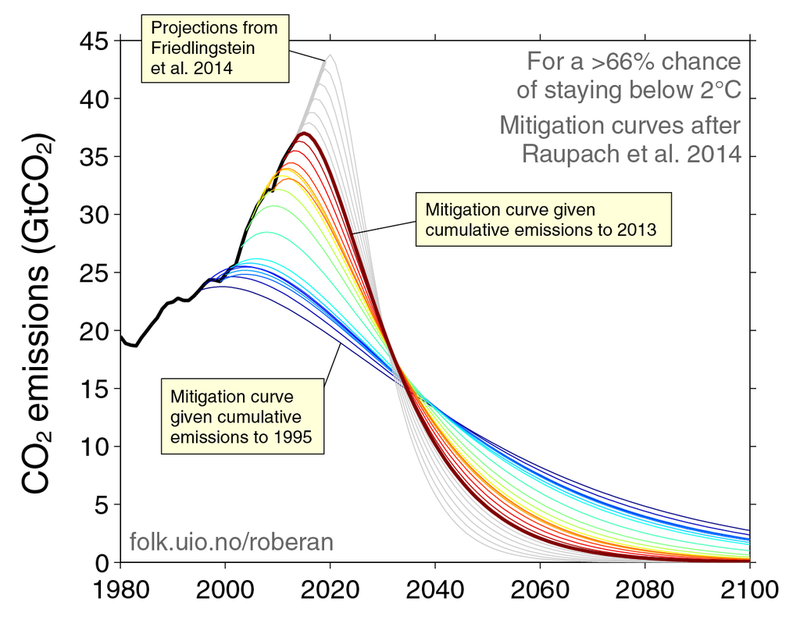
(Graph courtesy of Robbie Andrew)
A free daily email with the biggest news stories of the day – and the best features from TheWeek.com
You can see the problem. If global emissions wait until 2020 to peak, emissions have to drop like a rollercoaster. If they wait until 2030, they have to drop like a rock — i.e. virtually straight down, a six percent decrease every year without fail. By 2010, 30 countries — including the United States and most of Europe — had peaked their annual emissions, but they only account for 32 percent of all emissions. Even if the pledges made at the Paris talks hold, then 55 percent of emissions will have peaked by 2030.
Clearly, we're facing a mammoth task.
One way to think of this centers around decarbonization rates, or how much greenhouse gas an economy has to emit per unit of GDP production, and how fast it can decrease that ratio year after year. Pielke, a political scientist and public policy writer who specializes in science and climate issues, has something he calls the "Iron Law of Climate Policy." Basically, if societies have to choose between reducing emissions and reducing economic growth, reducing emissions always loses. That makes sense — economic growth largely makes modern civilizational stability and moral advance possible. Without it, human beings would be locked in a perpetual zero-sum conflict over resources. (Incidentally, this is also why rapidly rising inequality can be so destructive.)
So how fast can we decarbonize while still maintaining decent economic growth paths? That's really the question of the hour.
Pielke tried to game out a few situations in his book. But his argument largely relies on comparing current decarbonization rates for various advanced countries with the rates they'd have to reach to hit the global climate markers. Needless to say, everyone has to speed way up. Hence Pielke's infamously glum take on efforts to curb greenhouse gas emissions.
But this would hardly be the first time a national or global economy has gone through a sudden, massive shift. Here's the cost path traced by solar panel cells over the last few decades. Solar has gotten very cheap, and fast.
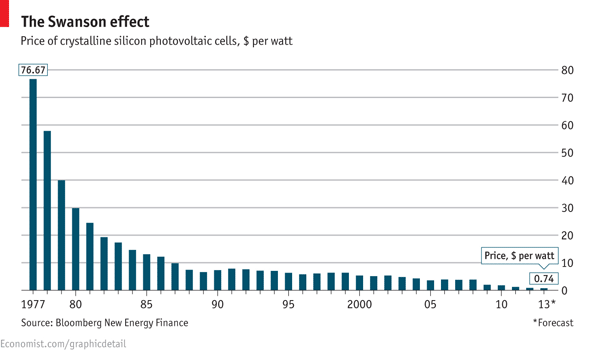
(Graph courtesy of The Economist)
And here's the growth in solar power installations up until 2012, which has outpaced even the most optimistic scenarios outlined by the likes of Greenpeace, and is now on a trend line headed almost straight up.
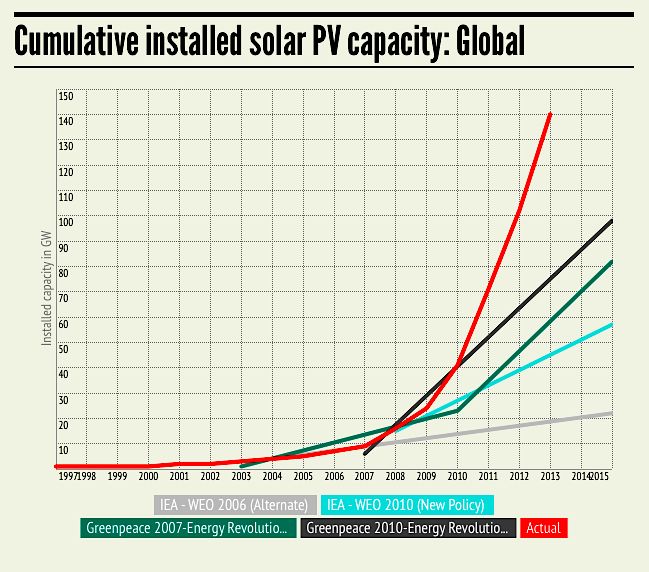
(Graph courtesy of CleanTechnica)
Wind is performing admirably, too. And just generally, the speeds at which new technologies are taken up by the U.S. population are now lightning fast. Heck, you can even zoom all the way out to the whole history of global economic growth, which trundled along at almost nothing for centuries, and then exploded in the last 200 years.
The sort of systemic economic shifts we're talking about here are rarely slow, linear grinds. They're sudden, massive tipping points, where the trend line suddenly curves upwards (or downwards) like a rocket, thanks to a lot of hidden groundwork beforehand. Green energy sources like wind are already cheaper than coal and natural gas, and solar is catching up fast. So we're rapidly approaching the moment when the costs of going green won't be the costs of making people pay for more expensive energy, but simply the one-time cost of shifting the national energy infrastructure over. Our ability to generate more economic output per unit of energy is increasing too, breaking the historic link between energy consumption and growth. Meanwhile, poorer and developing countries are poised to quickly buy up massive amounts of green energy capacity, assuming the advanced world builds it in enough and sufficiently cheap quantities, and we repair global trade policy.
This has all occurred largely without any coordinated international effort. So what would happen if the U.S. and major European power got their acts together in the next few years and passed a carbon price?
Pielke worries that a simple tax on carbon emissions would slow economic growth. But both theoretical economics and real world demonstrations suggest that, if properly designed, you can eliminate the economic drag as well as any regressive hit to the poor. And these sorts of taxes (or "fees," if you will) can also be ratcheted up incredibly fast. On top of all that, the global economy is signaling an enormous need for new debt spending from advanced countries to boost global growth. So our governments have the opportunity to provide huge amounts of green energy capacity, and jobs installing and maintaining it, with minimal tax increases.
We just have to choose to do all this.
We have no idea how fast the American, European, or global economies can decarbonize without harming growth. Because we've never tried really tried to push our economies as hard as possible in that direction. The voluntary, bottom-up structure of the Paris agreement could allow for it to start happening, as countries experiment, succeed, and then begin building on those demonstrations and pressuring others to join.
This doesn't mean it will work. But if it doesn't, the alternative is global catastrophe. So this isn't really a case for optimism or pessimism. It's just the way it is.
Jeff Spross was the economics and business correspondent at TheWeek.com. He was previously a reporter at ThinkProgress.
-
 El Paso airspace closure tied to FAA-Pentagon standoff
El Paso airspace closure tied to FAA-Pentagon standoffSpeed Read The closure in the Texas border city stemmed from disagreements between the Federal Aviation Administration and Pentagon officials over drone-related tests
-
 Political cartoons for February 12
Political cartoons for February 12Cartoons Thursday's political cartoons include a Pam Bondi performance, Ghislaine Maxwell on tour, and ICE detention facilities
-
 Arcadia: Tom Stoppard’s ‘masterpiece’ makes a ‘triumphant’ return
Arcadia: Tom Stoppard’s ‘masterpiece’ makes a ‘triumphant’ returnThe Week Recommends Carrie Cracknell’s revival at the Old Vic ‘grips like a thriller’
-
 The pros and cons of noncompete agreements
The pros and cons of noncompete agreementsThe Explainer The FTC wants to ban companies from binding their employees with noncompete agreements. Who would this benefit, and who would it hurt?
-
 What experts are saying about the economy's surprise contraction
What experts are saying about the economy's surprise contractionThe Explainer The sharpest opinions on the debate from around the web
-
 Late night hosts joke about Trump's forced exodus from Facebook to blog
Late night hosts joke about Trump's forced exodus from Facebook to blogSpeed Read
-
 Fox News admits Biden doesn't actually want to cancel meat. Late night hosts pounce anyway.
Fox News admits Biden doesn't actually want to cancel meat. Late night hosts pounce anyway.Speed Read
-
 The death of cities was greatly exaggerated
The death of cities was greatly exaggeratedThe Explainer Why the pandemic predictions about urban flight were wrong
-
 Manhattan D.A. will stop prosecuting sex workers, not their clients, pimps, or sex traffickers
Manhattan D.A. will stop prosecuting sex workers, not their clients, pimps, or sex traffickersSpeed Read
-
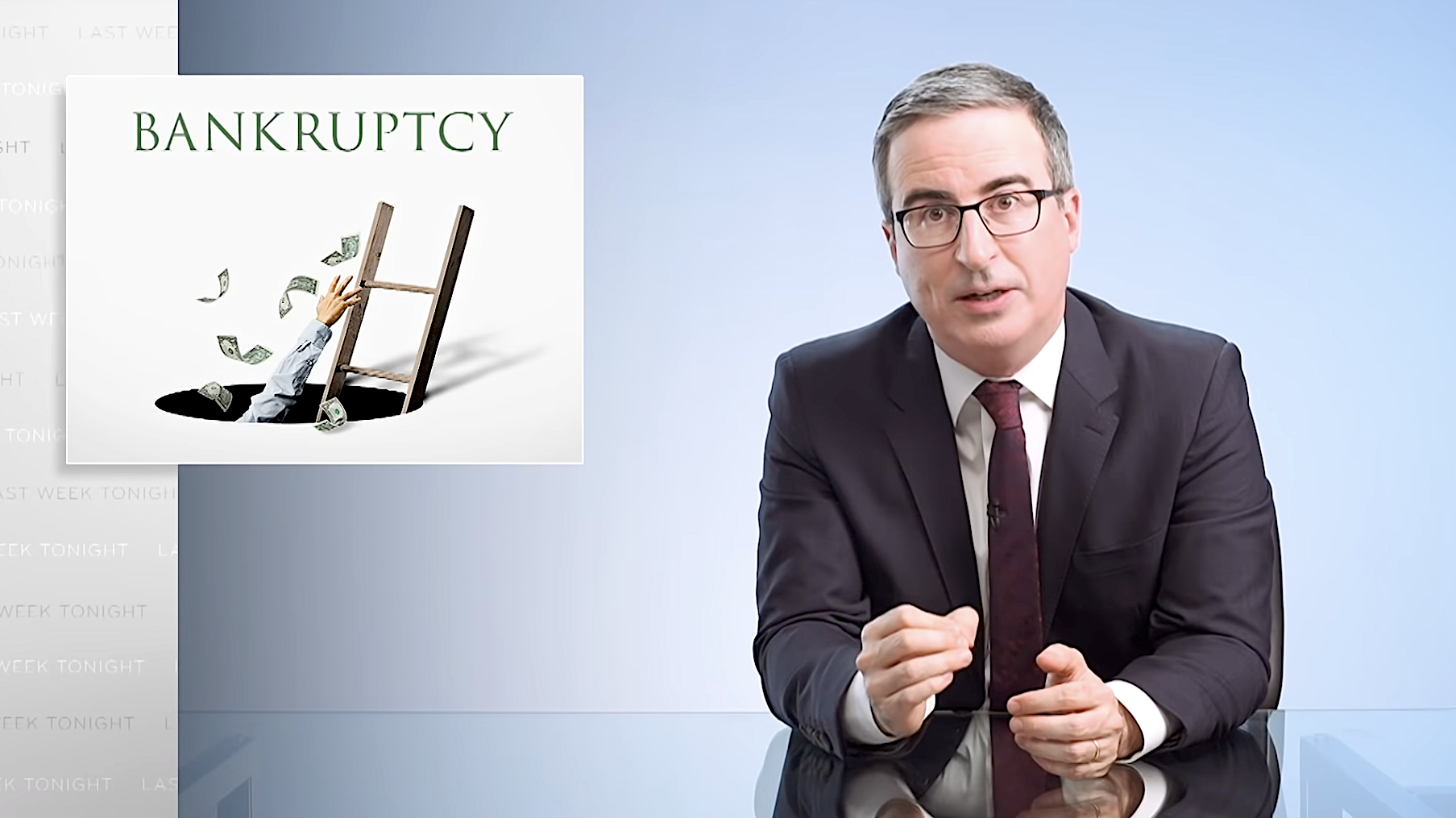 John Oliver explains personal bankruptcy, how credit card lobbyists and lawyers make it much worse
John Oliver explains personal bankruptcy, how credit card lobbyists and lawyers make it much worseSpeed Read
-
 John Oliver explores problems with U.S. nursing homes and long-term care, suggests you pay attention
John Oliver explores problems with U.S. nursing homes and long-term care, suggests you pay attentionSpeed Read
